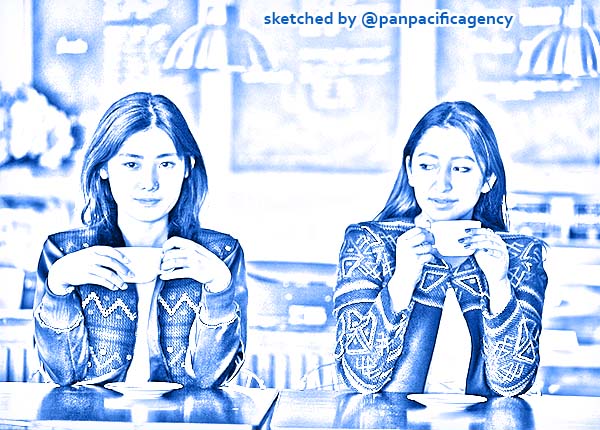[Analytics] Bhutan: Chasing development in the Dragon Kingdom

Bhutan's fashion girls. Photo by: experiencetravelgroup.com. Sketched by the Pan Pacific Agency.
Two photographs encapsulate the complexity of Bhutan’s 11-year-old democracy. In the first, the King of Bhutan accepts an award from the United Nations Development Programme for advancing human development and the wellbeing of the people of Bhutan. In the second photograph, a few lone yaks graze at the base of a massive mountain under the caption ‘Yak Herding on the Decline’, symbolising the decline of rural livelihoods, the degradation of the natural environment and advance of rural–urban migration. Susan Banki specially for the East Asia Forum.
The tiny country of Bhutan — famous for its concept of Gross National Happiness and carbon neutral policies — continues to struggle with its careful implementation of democracy, while also trying to strengthen the economy, steady the environment and reduce inequality.
With the victory of the Druk Nyamrup Tshogpa (DNT) party in October 2018, Lotay Tschering took the reins as Bhutan’s Prime Minister, overseeing the country’s third elected government. Campaigning on a platform of ‘Narrowing the Gap’, the DNT prioritised strengthening the economy, reducing inequality, addressing unemployment (particularly among the youth), equalising primary and secondary school education and improving public services. Initiatives associated with these efforts were met with varying degrees of success and various degrees of opposition.
Despite concerns at the end of 2018 that the economy had only grown 4 per cent, in 2019 Bhutan adopted a relatively cautious approach to two segments of the economy where growth has proven potential: energy production and tourism.
Hydroelectricity sales to India account for 25 per cent of Bhutan’s total revenue, with the promise of a great deal more if current plans for several additional hydropower plants are eventually completed. But grave concerns about the environmental, management and financing impacts of these projects have raised red flags for officials.
While 2019 witnessed the inauguration of one power plant — the Mangdechhu Hydroelectric Project — momentum on other energy projects has slowed. A landslide at Punasangchhu-I in January pushed back the opening of that plant from an originally scheduled completion date of 2016 until 2024. Bhutan also dug in its heels with India on the negotiation of the Sunkosh Mega Project, insisting on better financing and more authority to oversee its construction. Bhutan retains a ‘special friendship’ with its southern neighbour — the two countries continue to negotiate not only on hydropower projects, but also on foreign assistance for development, a joint hospital initiative and the construction of railway links to improve cross-border connectivity.
The allure of a modern-day Shangri-La continues to make Bhutan a sought-after travel destination. The country’s expensive tourist fees, previously not imposed for citizens of India, Bangladesh and the Maldives, will be levied on all tourists from 2020. This follows calls for regulating regional tourism after an Indian traveller sparked outrage among Bhutanese for climbing to the top of a stupa during his bicycle tour.
Indians make up around 200,000 of the country’s estimated 275,000 tourists every year. New levies may alter the potential for southern districts near the border to attract travellers. There is already significant jockeying for who will be the beneficiaries of Bhutan’s growing tourism trade — in 2019, the government shifted the budget of the national tourism program away from a district in the eastern region to one in the southern region amid accusations of political favouritism.
Efforts to address Bhutan’s inequality have taken several forms. In addition to youth training programs and the implementation of a farmers’ insurance scheme, the government instituted the Fourth Pay Commission scheme. This significantly increased the salary of some civil servants, such as those employed in education and health, while keeping others level, like local government officials. On his personal website, former prime minister Tshering Tobgay critiqued these measures as insufficient and counterproductive.
Despite myriad problems with addressing unemployment through overseas work — including concerns about trafficking, extreme exploitation and the deaths of 171 migrant workers — the Ministry of Labour and Human Resources has revamped and re-instated the Overseas Employment Scheme. Government-to-government programs are seen as ideal because they avoid the corruption and mismanagement of overseas labour agencies.
The government also extended free education through Class 12 for all Bhutanese students, sparking survival concerns among the country’s 21 private schools. Previously, education was free only through Class 10. Education and employment efforts for youth clearly remain a priority, particularly in light of concerns linking a lack of opportunities with growing drug and alcohol addiction.
In the human rights arena, some areas improved more than others. The issue of the country’s long exiled population remains unresolved. While more than 100,000 of Bhutan’s refugees have gained permanent residence in countries like the United States and Australia, an estimated 7000 remain in Nepal with their sights firmly set on return to Bhutan. Until today, not one has been permitted to return.
The National Assembly made strides on LGBTQ rights, passing amendments to remove sections of the Penal Code that criminalise ‘unnatural sex’. But the country remains hampered by significant restrictions on freedom of the press. Few laws exist to protect media freedom, and the country’s unions and media organisations are nearly all aligned with the Royal Family or the government. Political prisoners from the country’s pre-democracy days remain imprisoned — a petition from Bhutanese in 12 countries sent in November calls for their release.
It is estimated that growth in Bhutan will reach 7.4 per cent in the 2019–2020 financial year. This growth may alleviate unemployment — but it also has the potential to aggravate inequality, environmental degradation and rural–urban migration.
Susan Banki is a Senior Lecturer of human rights at the Department of Sociology and Social Policy, the University of Sydney. This article is part of an EAF special feature series on 2019 in review and the year ahead.